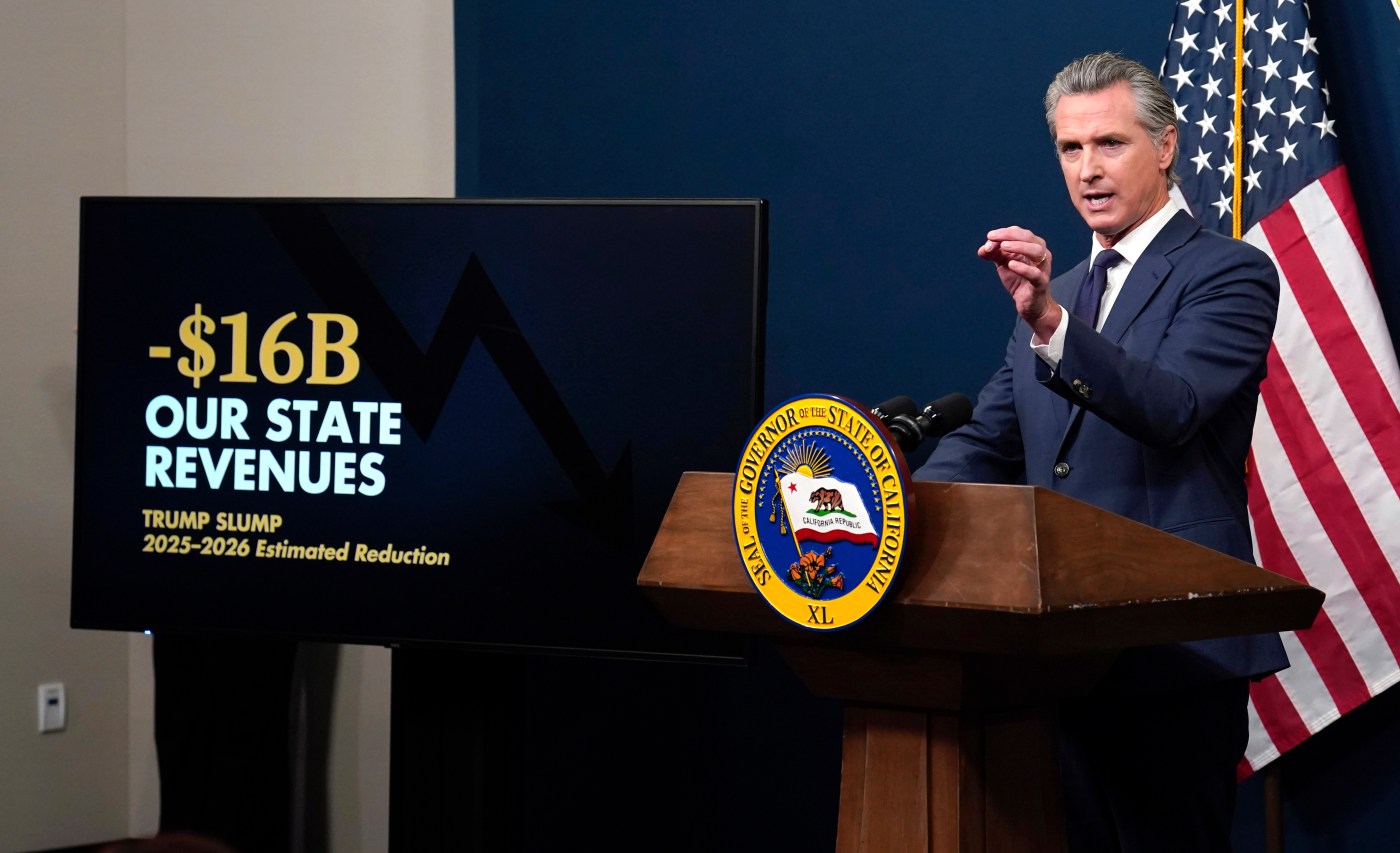When Gov. Gavin Newsom introduced his fiscal year 2025-2026 budget in January, he said California’s finances were improving.
Now, the state is staring down a nearly $12 billion budget shortfall, largely because of market volatility driven by President Donald Trump’s oft-changing tariffs, Newsom said during a news conference Wednesday outlining the annual May revision of the budget proposal.
Plus, the cost of Medi-Cal, the state’s health program for low-income and disabled residents, has ballooned. More immigrants without legal status have signed up for Medi-Cal than officials expected since California became one of the first U.S. states to expand the health plan to include them in 2024.
“Obviously, we need to plan for the long term, which is difficult in the best of times,” Newsom said. “But in a time of just extraordinary uncertainty, it is particularly challenging.”
The Legislature must adopt a balanced budget by June 15 for the fiscal year starting July 1.
Newsom is largely maintaining the high levels of spending that have characterized his leadership since he took office in 2019. He is proposing $226.4 billion in spending from the state’s general fund, less than last year’s $233.2 billion. But it’s far above the $147.8 billion in general funds spent in the 2019-2020 budget, Newsom’s first as governor.
To balance the budget, Newsom proposed pausing the Medi-Cal extension to new adults without legal status and charging adult enrollees $100 monthly premiums. About 1.6 million immigrants without legal status have enrolled in Medi-Cal since January 2024, according to CalMatters. Other balancing moves include tapping reserves — as was planned in January — and a combination of loans and reallocations.
“Our approach was not to kick people off and roll back the expansion, but to level-set on what we can do and what we can’t do,” Newsom said.
California Republicans quickly criticized the Democratic governor for his leadership on the budget, noting they had opposed his expansion of Medi-Cal to immigrants in the country without legal status.
Sen. Brian Jones, the Republican minority leader in the state senate, said the governor “is finally waking up to the budget disaster he created.”
On homelessness and housing, Newsom’s budget would not renew funding to a handful of key programs that subsidize affordable housing and support local homelessness efforts. Housing advocates said that means developers could soon be without hundreds of millions of dollars in state tax credits and loans, which are crucial to financing low-income projects.
“We would see a stall in the affordable housing pipeline pretty drastically,” said Christopher Martin, policy director with Sacramento-based Housing California.
In addition to offering less money for housing, Newsom declined to extend a program that last year earmarked $1 billion in homelessness funding for local governments — even as he’s upped the pressure on cities and counties to move more people off the street.
Local officials voiced frustration over the proposed homelessness spending levels, as well as the lack of funding to support Proposition 36, a measure voters overwhelmingly approved last year that increased penalties for low-level theft and drug offenses.
“California voters have been very clear about their state priorities: reduce homelessness and reduce crime,” Graham Knaus, chief executive of the California State Association of Counties, said in a statement. “The budget proposal would not fund either of those priorities.”
In the realm of education, Newsom’s budget revision includes additional spending in literacy initiatives, including $10 million for dyslexia screening. The governor cited his own dyslexia Wednesday for presenting the proposed budget without a teleprompter.
The proposal reduces the estimate of guaranteed school funds under Proposition 98, the voter-approved, constitutional mandate that guarantees minimum funding for K-12 schools and community colleges. That funding would drop by $250 million in the 2024-25 school year and nearly $4.4 billion in 2025-26.
However, the plan expands funding for the state’s universal transitional kindergarten program that will be available to all 4-year-olds in the fall by cutting back community college funding more than $492 million over the next three fiscal years.
Newsom’s revised budget also significantly scales back his January budget’s funding cuts to California State University — now $143 million — and the University of California — now $129 million. The state had previously proposed cutting $375 million from CSU and $396 million for UC.
On the environment, Newsom announced plans Wednesday to streamline approval for his $20 billion plan to build a massive, 45-mile long tunnel under the Sacramento-San Joaquin Delta to make it easier to move water from Northern California to Southern California.
The governor plans to introduce a bill that would make it easier for state planners to take land in the tunnel’s Delta route by eminent domain, extend deadlines for water rights permits, and require courts to rule on lawsuits against the tunnel project within 270 days.
Environmentalists, some of whom say the tunnel would harm fish and water quality in the Delta, blasted the move and said more local water solutions are needed instead. Water agencies praised the announcement.
Newsom also announced he plans to work with the Legislature to re-authorize the state’s cap-and-trade program, which requires factories, power plants, and other polluters to buy credits for greenhouse gases they emit.
The program generates $3 billion to $5 billion a year, which has been spent on renewable energy, mass transit, the state’s high speed rail project and other programs.
Newsom proposed shifting $1.7 billion a year from the program, which he wants to rename “cap and invest,” to help fund CalFire, a move that could draw some pushback from environmental groups.





